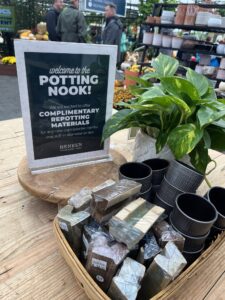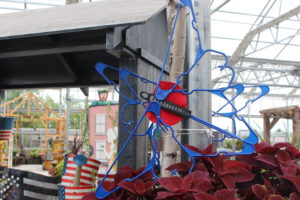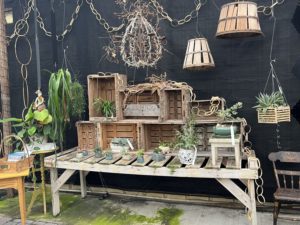The Next Generation
Remember Generation X? Well, the times they are a-changing. Generation X is a dated term in today’s world; our realities revolve around constant change, breaking news, technological advances and a culture of instant gratification. Two years ago, I was honored to be named Young Grower of the Year and given the opportunity to write about our industry. I still ascribe to the words I wrote then: “Floriculture has a bright future with endless possibilities, tieins and marketing opportunities. Its future, however, is not without challenges, requiring creativity, innovation, passion, hard work and, most important of all, balance.”
The underlying concept is, as in so many aspects of our lives, sustainability. How do we, as young industry leaders, attract the next generation of professionals and in turn, how do those young recruits help us appeal to a younger customer base? While there are no easy answers, there are strategies, marketing ideas and support systems that point us in the right direction. Forward thinking is key to our success, proactive rather than reactive planning. Forget about Generation X, and take your cue from the OFA An Association of Floriculture Professionals Generation Next committee. Success and sustainability rely on constantly looking forward to the next group of professionals and customers, anticipating their needs and expectations, and balancing everything in a way that keeps you one step ahead.
Today’s Customer
Floriculture’s history and staying power do not guarantee success, particularly in light of our industry’s challenges and everincreasing competition. The economy is on a downswing, energy costs are on the rise and today’s marketplace demands we break away from traditional categories and build displays and programs that sell a lifestyle and extend the home outward. Today’s customer looks for instant gratification and beautification. I am selling more than a plant; I’m selling a way of life. That old adage, “Find something you love to do, and you will never work a day in your life,” is as relevant in f loriculture as in any other field. Each sale requires enthusiasm, passion and excitement.
I have to read my customers, understand their expectations and teach them about successes. Customers want inspiration, and they look to my team of professionals to harness our knowledge, expertise and education and translate it into simpler terms, creating outcomes they could replicate. Displays take the individual components the plants, containers, and accessories and sculpt them into an enviable finished product. Cross-departmentalization is critical, and tie-in sales are readily achievable, provided you utilize your most powerful tool: education.
Leading by Example
As in other fields, attracting young employees is not an easy feat. Education can be an attractive benefit and the way a manager approaches training and supervision impacts the working environment and one’s ability to retain and develop new employees. Mentoring is also an important development tool. I approach job training as the chance to impart the bigger picture. I want my employees to be empowered and to feel invested in our company and the success of our division.
I view my relationship with my employees as one of collaboration. We work as a team to grow our plants, create combinations, design end caps and displays, and anticipate our customers’ desires. Context helps to solidify the team. Each task is part of a larger whole. I don’t instruct how and when to water. Instead, I teach about the life cycle of the plant, its water needs and how our growing and watering schedules work. I encourage my employees to contribute ideas and marvel at the modern twists and chic combinations they create.
Together, we collaborate with our sister departments, creating Internet newsletters fi lled with lush photos, ideas and special offers, as well as sleek, attractive signage to complement our displays. Finally, I encourage my employees to think about the next level of education: courses and industry events. I model the behavior, teaching at the New York Botanical Garden and working on the OFA Generation Next committee. Education works best when it infi ltrates every level and the big picture extends outside of Matterhorn’s “walls.”
Education Matters
I have spent almost my entire professional life at Matterhorn in Spring Valley, N.Y. If I had to pick one reason our collaboration works so well, it would have to be the value Matterhorn has always placed upon education. As we evolved from a small wholesale plant nursery to a thriving retail garden center with 12 acres of display gardens and a shopping village, education remained a priority. Matterhorn capitalized on display gardens, labeled with botanical and growing information, almost from day one. Back then, landscapers and industry professionals used the knowledge they gained to sell projects to their homeowner customers. When Matterhorn made the transition to retail, education helped our new customer base visualize the possibilities.
The real power of education lies in its ability to foster success for a broad range of customers, from the do-it-yourself crowd who rely on our garden workshops to the landscape customers who view the Gardens at Matterhorn and hire our crews to transform their own environments. Education is a beautiful tool, but like any tool it needs to be used correctly. Education works best if it is applied at every level, which brings me back to passion, excitement and enthusiasm. An educated employee is able to access the passion that results in sales and is invested in our business and our industry.
Priming the Next Generation
The mission of the Generation Next committee is to ensure the continuity of OFA by reaching out to the young and new fl oriculture professionals. By inspiring, motivating and mentoring, we will open the path to professional success and lifelong involvement in OFA. That mission is relevant to the entire fl oriculture industry and, for that matter, just about any other industry. Inspiring, motivating and mentoring I would be hard pressed to fi nd an industry that would not benefi t from the transformative power of those actions. One of the primary ways Generation Next attempts to meet its mission is through its Scholars Program, which aims “to expose students to various facets of the fl oriculture industry,” according to OFA. The Scholars Program focuses on professional development and emphasizes the importance of going beyond the limits of the academic program and coursework.
Opportunities to learn with and from colleagues are invaluable; the Scholars Program provides access to education sessions, networking events and a one-on-one mentor. I urge managers and owners to seek out these opportunities for their employees. Use this as a selling point when recruiting interns, posting jobs on industry websites and speaking to potential employees. I network constantly, traveling to floriculture events in an effort to keep abreast of industry trends. The conferences I attend and the people I speak with provide invaluable insights into the changes and challenges in the industry.
I seek out new technologies and the opportunities they create. I can pick and choose the best-bred plants. Invite your employees to share these experiences. Watch as these interactions invigorate your workplace, transforming it into a creative center filled with new directions. Investing in your employees’ education and providing conference and other professional opportunities will be well worth it and will strengthen your team, your business, our industry and the bottom line.
Striking a Balance
Today, more than ever, floriculture is about balance. Balance between aesthetics and competing in a world of mass markets. Balance between staying true to our botanical names and educational practices and giving our customers ready-made gardens and containers. Balance between limitless possibilities, countless plant varieties, and our customized approach and utilizing our physical structures and resources to create the most efficient and economical growing conditions. As I wrote two years ago, finding that balance can make you dizzy, but it is critical to success and to the growth and viability of the industry.
Floriculture is changing every day. Branding and crossover into other industries are as relevant to f loriculture as they are to any other retail venture. It is much harder to stay ahead and grow the hottest new plant than it is to perfect your growing practices. Taking the time to educate and mentor young employees will help you understand the needs and wants of the younger customer; the next generation will keep you on the cutting edge. They understand the importance of upgrades, ready-made combinations for instant beauty and how to create an image that will attract a younger customer base. This year, one of my younger colleagues proposed selling wheatgrass arrangements: simple, elegant and oh-so-appealing to the young customer with disposable income.
Embrace Change
Professional practice is about all of the seemingly small decisions that go into each day, month and year. It is about balance. A good manager understands the importance of tending to the big picture, while simultaneously managing the small details. Embrace change: Let the old department separations go and try not to think in terms of annuals, perennials, nursery stock, pottery and all the other traditional categories. Most importantly, embrace new ideas and mentor younger colleagues; encourage them to take part, initiate conversations about future directions and suggest innovative practice, the introduction of a cool new plant or cutting-edge combination.
Recognize that learning is constant and learning is a two way street. Our clients want the big picture, the gorgeous pot fi lled with beautiful plants and the history and knowledge that make them come alive. Work with young employees to make possibilities realities, positioning your business for a successful future and always striving to attract a new, broader generation of customers.


















 Videos
Videos





